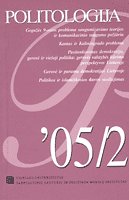Galia Ir Derybos
Power And Negotiation
Author(s): Rolandas KačinskasSubject(s): Politics / Political Sciences
Published by: Vilniaus universiteto leidykla & VU Tarptautinių santykių ir politikos mokslų institutas
Summary/Abstract: Regardless of the popular wisdom to make predictions in negotiations as if they always reflect the right according to the Bible– that “to every one who has will more be given” – this article starts with observation that weaker parties can and do sometimes successfully negotiate with stronger parties. Naturally this provokes questions: “Why can weak parties successfully negotiate with the stronger parties in asymmetric negotiations? How to explain this structural paradox?”. The article argues that these questions would be old and answered if not for the long lasting tendency in the international relations discipline to analyze international negotiations from the point of view of the traditional power understanding, as well as systemic international relations theories. On another hand, difficulties objectively arise due to the fact that analysis of the structural paradox is connected to the problem of power – one of the most complex and difficult to define categories of the social science. And although much has been done recently in the social science to improve our understanding of the concept of power, it is still unclear what is the best way to conceptualise it. Detaching the notion of power from resources, in this article power is associated to the structure of negotiation, comprising of number of parties, interests, resisting points and possible zone of agreements, thus leaving the concept of power open to much more detail and accurate analysis. Having said that the structural analysis does not renounce the importance of resources all in all since every negotiation begins with a certain distribution of actor characteristics that are given. However, important are only the issue related characteristics. Moreover, as the structural model of analysis demonstrates, power is not a constant. The structural characteristics can be “photographed” at the beginning but may change during the process. In addition, the structure may be manipulated that in turn indicates that power is also a matter of perception. Perception mediates objective negotiating structure, although reality imposes certain limits on the implication of perceptions.
Journal: Politologija
- Issue Year: 2005
- Issue No: 1 (37)
- Page Range: 026-054
- Page Count: 29
- Language: Lithuanian

